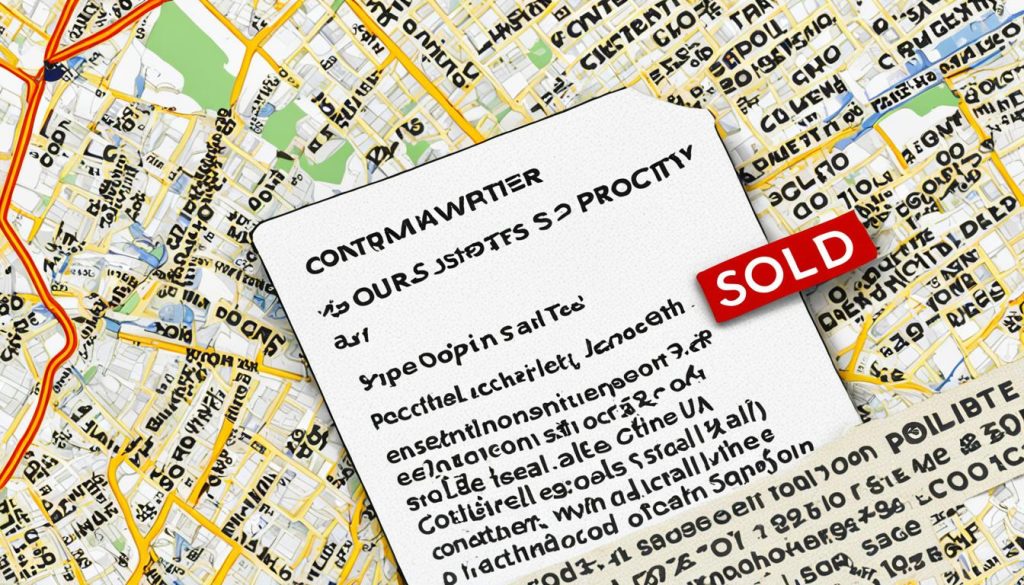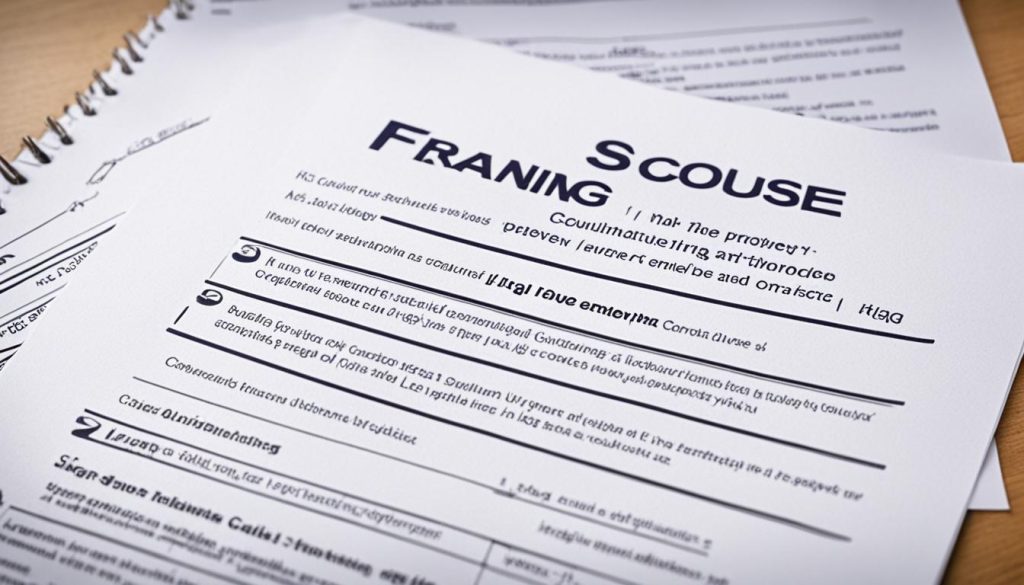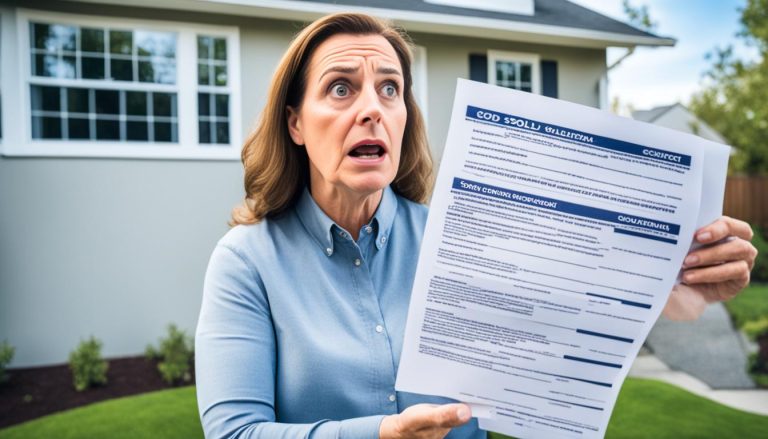Understanding the meaning of “sold STC” is essential in the UK property market. This term represents an important stage in the process from offer acceptance to completion. So, what exactly does it mean?
“Sold STC” is a commonly used phrase in the property industry, indicating that a property has been sold subject to contract. It signifies that the seller has accepted an offer from a buyer but the legal contracts have not yet been exchanged. At this stage, the property is no longer actively marketed, but the sale is not yet legally binding.
During the sold STC phase, both the buyer and the seller proceed with the necessary steps to finalize the transaction. This includes tasks such as property surveys, mortgage applications, and negotiation of terms. Once all the contractual obligations are met, the sale progresses to the completion stage.
Understanding sold STC is crucial for buyers and sellers alike. By familiarizing themselves with this concept, individuals can navigate the property transaction process with confidence, knowing the implications and steps involved.
In the following sections, we will delve deeper into the definition of sold STC, the journey from offer acceptance to STC, and the key factors to consider during this phase. Stay tuned to gain a comprehensive understanding of this important aspect of the UK property market.
What Does Sold STC Mean in UK?
In the UK property market, the term “sold STC” stands for “sold subject to contract.” It is used to indicate that an offer has been accepted by the seller but the transaction is not yet legally binding. This status acknowledges that the property is no longer available for other buyers to make offers on, but there are still steps to be completed before the sale is finalized.
When a property is marked as “sold STC,” it means that the seller has accepted an offer from a buyer. However, there are conditions that need to be met before the contract can be exchanged and the sale becomes legally binding. Until the exchange of contracts, either party can withdraw from the transaction.
This stage is significant because it signifies progress in the property buying process. It shows that the buyer and seller have agreed on the fundamental terms of the sale, such as the price and the conditions set out in the offer. However, it is important to note that being “sold STC” does not guarantee that the sale will proceed to completion.
Understanding the meaning of sold STC provides clarity on the status of a property transaction and allows both buyers and sellers to navigate the process with confidence. It sets the stage for the next steps in the buying and selling journey.

The journey from offer acceptance to STC
In the UK property market, the journey from offer acceptance to “sold STC” involves several essential steps. Understanding this process is crucial for buyers and sellers alike. Let’s walk through each stage to gain a deeper understanding of how a property transitions from accepting an offer to being marked as “sold STC.”
- Acceptance of Offer: Once a seller accepts the buyer’s offer, the legal process begins. Both parties agree on the terms and conditions of the sale, including the price, completion date, and any special conditions.
- Instructing Solicitors: The buyer and seller each appoint their solicitors or conveyancers to handle the legal aspects of the transaction. These professionals facilitate the transfer of ownership and ensure all legal requirements are met.
- Preliminary Checks: The buyer’s solicitor conducts various checks, such as verifying the property’s title, local authority search, environmental search, and other necessary investigations to ensure a smooth transaction. Any issues discovered during these checks may need to be addressed before proceeding.
- Obtaining Mortgage: If the buyer requires a mortgage to purchase the property, they need to secure a mortgage offer. The lender assesses the buyer’s financial situation and the property’s value to determine the mortgage amount.
- Exchange of Contracts: At this stage, both parties’ solicitors exchange signed contracts. The buyer pays a deposit, usually 10% of the property’s purchase price, which becomes non-refundable. Once the contracts are exchanged, the sale becomes legally binding.
- Completion: On the agreed completion date, the buyer’s solicitor transfers the remaining balance to the seller’s solicitor. The keys are handed over to the buyer, and the property officially changes ownership.
- Sold STC: After completion STC, the property is marked as “sold STC” (Subject To Contract). This term indicates that a sale has been agreed, but the legal process has not yet concluded, and final contracts have not been signed.
Understanding the journey from offer acceptance to “sold STC” provides valuable insights into the property transaction process. It enables buyers and sellers to navigate each stage confidently and ensures a smoother experience overall.

What happens after a property is marked as sold STC?
Once a property is marked as “sold STC,” there are several important steps that need to be taken to move the transaction forward. This section will provide a simple explanation of what happens next and what buyers and sellers can expect during this stage of the property transaction.
After a property is marked as sold subject to contract, the buyer and seller enter into a legally binding agreement, outlining the terms and conditions of the sale. This agreement is commonly known as the memorandum of sale. It serves as a formal record of the agreed-upon price, buyer’s and seller’s details, and any additional terms.
One of the key tasks that follow the sold STC status is the buyer’s conveyancing process. Conveyancing refers to the legal transfer of property ownership from the seller to the buyer. During this stage, the buyer’s solicitor or conveyancer will carry out various checks and searches to ensure the property’s legality and identify any potential issues, such as outstanding debts or restrictions.
Simultaneously, the buyer will arrange a mortgage (if required) and initiate a valuation survey on the property. The mortgage lender will assess the property’s value and condition to determine the loan amount they are willing to provide to the buyer. This survey is essential to protect the lender’s interests and ensure the property’s value aligns with the agreed-upon price.
Furthermore, the buyer may choose to commission additional surveys, such as a homebuyer’s report or a full structural survey, depending on their needs and concerns. These surveys provide detailed assessments of the property’s structural integrity, highlighting any potential defects or areas requiring maintenance or repair.
While the buyer is completing their due diligence, the seller’s solicitor will gather all necessary documentation, including the title deeds, energy performance certificate (EPC), and property information form. These documents will be shared with the buyer’s solicitor to facilitate the conveyancing process.
Throughout this stage, communication and coordination between the buyer, seller, and their respective legal representatives play a crucial role. The solicitors will address any queries or concerns raised by the buyer during the conveyancing process, ensuring a smooth and efficient transaction.
Once the buyer’s conveyancing process is complete, and both parties are satisfied with the terms and conditions, the transaction proceeds towards the final exchange of contracts and completion. The exchange of contracts is the point at which the sale becomes legally binding, and the completion date is agreed upon.
On the completion date, the buyer’s solicitor will transfer the funds to the seller’s solicitor, and the property’s ownership will officially transfer to the buyer. At this stage, the property is no longer marked as sold subject to contract but instead moves to the “sold” status.
In summary, once a property is marked as sold STC, buyers and sellers enter into a legal agreement, and the conveyancing process begins. Buyers conduct surveys and arrange mortgages, while sellers provide necessary documentation. Effective communication between all parties is crucial to ensure a successful transaction. Ultimately, the process concludes with the exchange of contracts and completion, signifying the property’s official sale.
Understanding the implications of being sold STC
When a property is marked as sold subject to contract (STC), it is important for both buyers and sellers to be aware of the implications and considerations that come into play. This section will explore the key aspects of being sold STC and provide valuable insights into the process.
1. Financial Commitment
Once a property is sold STC, it signifies a significant financial commitment for buyers. It means that the buyer has made an offer that has been accepted by the seller, and both parties are legally bound to proceed with the transaction. Buyers should ensure they have secured the necessary funds or mortgage to fulfill their obligations.
2. Limited Flexibility
Being sold STC restricts the flexibility for both buyers and sellers. For buyers, it means they cannot back out of the purchase without facing potential legal consequences. Sellers, on the other hand, are obligated to proceed with the sale unless specific conditions, such as property inspections or surveys, are not met.
3. Timeframe Considerations
The timeframe for completing the sale becomes critical once a property is marked as sold STC. Buyers and sellers need to ensure that all necessary paperwork, legal processes, and financial arrangements are completed within the agreed timeframe. Any delays or complications can result in potential renegotiations or even the collapse of the sale.
4. Property Status
While a property is sold STC, it remains on the market until the sale is completed. This means that other interested buyers may still view the property or make backup offers. Sellers should consider this when planning their next steps and be prepared for potential competition or alternative offers.
5. Potential Risks
Both buyers and sellers face potential risks during the sold STC phase. Buyers should ensure that they conduct thorough property inspections and surveys to identify any hidden issues or defects in the property. Sellers, on the other hand, should be wary of potential buyer pullouts or delays in securing financing.
| Implication | Consideration |
|---|---|
| Financial commitment | Ensure adequate funds or mortgage to fulfill obligations. |
| Limited flexibility | Understand the legal obligations and limitations for both parties. |
| Timeframe considerations | Complete all necessary paperwork and legal processes within the agreed timeframe. |
| Property status | Be prepared for potential competition or alternative offers during the sold STC period. |
| Potential risks | Conduct thorough inspections and be aware of potential buyer pullouts or delays. |
Understanding these implications is crucial for both buyers and sellers to navigate the sold STC phase successfully and ensure a smooth property transaction.

Key factors to consider during the sold STC phase
In the process of buying or selling a property in the UK, understanding what it means when a property is marked as “sold subject to contract” (sold STC) is crucial. This phase signifies that an offer has been accepted, but the transaction is not yet finalized. To navigate the sold STC phase successfully, buyers and sellers should consider the following key factors:
- Financing and Mortgage Approval: Buyers should ensure they have secured the necessary financing and obtained a mortgage agreement in principle before proceeding with the purchase. This helps avoid any delays or complications during the sold STC phase.
- Property Inspections: Sellers should be prepared for potential property inspections that may be conducted during this phase. Buyers may request surveys, home inspections, or valuations to assess the condition and value of the property. Sellers should be cooperative and provide access for these assessments.
- Legal Considerations: Both buyers and sellers should engage the services of a solicitor or conveyancer to handle the legal aspects of the transaction. The solicitor ensures that all necessary legal documents are prepared, reviewed, and executed correctly.
- Chain Management: For buyers and sellers involved in property chains, where the purchase or sale is dependent on other transactions, effective communication and coordination are vital during the sold STC phase. Keeping all parties informed and aligned helps minimize delays and ensures a smooth process.
- Financial Milestones: Buyers and sellers should be aware of the financial milestones that occur during the sold STC phase. These may include the exchange of contracts, payment of deposits, and setting completion dates. It is essential to adhere to these milestones to maintain the integrity and progress of the transaction.
- Contingencies and Negotiations: During the sold STC phase, unexpected issues or negotiations may arise. Buyers and sellers should be prepared to handle contingencies, such as repairs or renegotiations based on survey findings. Flexibility and open communication are crucial to reaching mutually beneficial resolutions.
By considering these key factors during the sold STC phase, buyers and sellers can navigate the process effectively and reduce the potential for complications or delays.

Conclusion
In conclusion, understanding what “sold STC” means in the UK property market is crucial for anyone involved in buying or selling a property. Sold STC stands for “Sold Subject To Contract” and indicates that an offer has been accepted by the seller, but the property is not yet legally bound to the buyer. It signifies a transitional phase in the property transaction process.
By grasping the concept of sold STC and the implications it carries, individuals can navigate the transaction process with confidence and clarity. For buyers, it means that although their offer has been accepted, there are still steps to be taken before the sale is finalized. It’s important for buyers to conduct due diligence, such as surveys and mortgage arrangements, during this phase.
For sellers, marking a property as sold STC means that they have a provisional agreement with a buyer, but the sale is not yet legally complete. During this period, sellers should continue to consider offers and proceed with caution until the exchange of contracts takes place, which solidifies the sale.
FAQ
What does sold STC (Subject To Contract) mean in the UK?
Sold STC, or sold subject to contract, is a term commonly used in the UK property market. It means that a property has received an offer from a buyer, and the seller has accepted that offer. However, the sale is not yet legally binding until the contracts have been exchanged. Until that point, the property is still considered available for other potential buyers.
What is the definition of sold STC?
Sold STC refers to a property that has received an offer from a buyer and has been accepted by the seller, but the legal contracts have not been exchanged yet. It signifies that the property is in the process of being sold, but there are still some steps to be taken before the sale is finalized.
What is the journey from offer acceptance to sold STC?
The journey from offer acceptance to sold STC involves several steps. After a buyer’s offer is accepted by the seller, the buyer’s solicitor will conduct necessary checks, such as property surveys and searches. The buyer’s mortgage application and valuation will also take place during this period. Once these steps are successfully completed, and both parties are satisfied, the property is marked as sold subject to contract, indicating that the sale is progressing towards the exchange of contracts.
What happens after a property is marked as sold STC?
After a property is marked as sold STC, the legal process continues. The buyer’s solicitor will draft and review the contracts, ensuring that all details and conditions are met. Searches and surveys will be finalized, and any necessary arrangements will be made for the mortgage and exchange of contracts. It is at this stage that the sale becomes legally binding, and both parties are committed to completing the transaction.
What are the implications of being sold STC?
Being sold STC has implications for both buyers and sellers. For buyers, it means that they have secured an agreement from the seller and can proceed with the legal process, arranging finances and preparing for completion. For sellers, it means that their property is off the market but still subject to legal and financial conditions before the sale can be finalized. It offers a level of certainty but also requires cooperation and patience from both parties.
What are the key factors to consider during the sold STC phase?
During the sold STC phase, both buyers and sellers should consider certain key factors. Buyers should ensure they have the necessary financing in place and prepare for the completion process, including arranging removals and utilities for the new property. Sellers should cooperate with their solicitors, respond promptly to requests for further information, and be prepared for potential renegotiations or delays. Both parties should maintain good communication and seek professional advice if needed throughout this stage.






